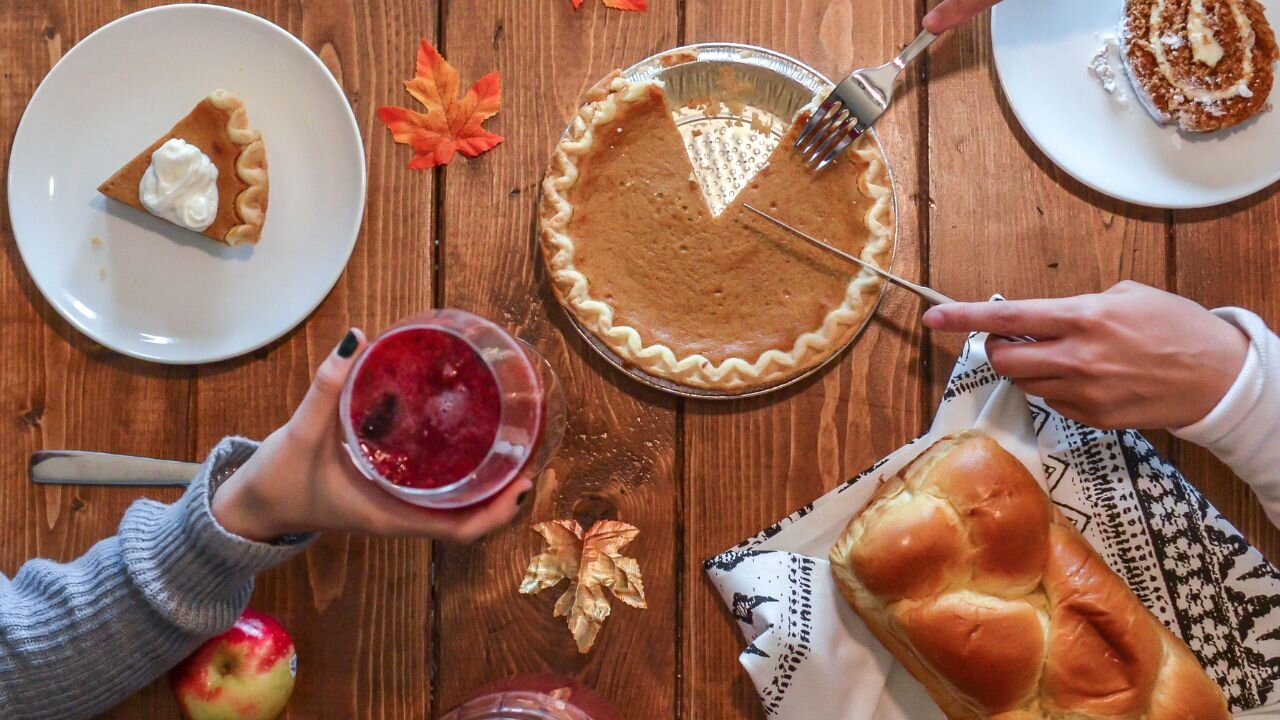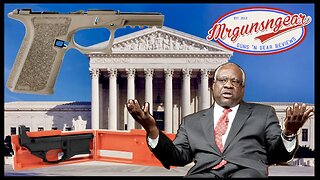Premium Only Content

Which state has the best holiday bakers?
Kansas residents are the nation’s most passionate holiday bakers, racking up over 18 hours of holiday baking time during the festive season.
The results emerged in a survey of 5,000 Americans, split evenly across all 50 states, that examined holiday baking trends, habits and approaches this year.
It found that those in The Sunflower State said they’ll spend 18 hours and 36 minutes in the coming weeks — over four hours longer than the national average (14 hours and 12 minutes).
Tennessee boasts the most confident bakers when it comes to whipping up holiday treats. Respondents were asked to rate their skillset out of 10, and Tennesseans gave themselves a 7.4, the highest score in the country.
The most humble bakers reside in California and Wisconsin, both states scoring their baking prowess at a modest 5.9.
Commissioned by Pillsbury Baking and conducted by Talker Research, the survey also examined the popularity of giving baked goods as gifts this holiday.
Forty percent of Americans, regardless of the state in which they reside, said they are giving baked goods as gifts this year — with those in Montana (52%) most likely to be doling out homemade treats as presents, the most of any state.
Receiving baked goods goes down well — 62% of respondents said this was the best gift to get. And it's especially well-received in Virginia, where 72% of respondents agreed they're the top gift.
“It’s touching to see holiday baking cherished as a tradition across the country,” said Eric Mills, marketing director for Pillsbury Baking. “We’re honored to be part of these festive moments — from gifting cookies to loved ones to baking brownies for cozy movie nights, creating treats together is one of the sweetest ways to celebrate the season.”
Fifty-six percent of West Virginians describe their kitchens as “chaotic” during the festive season, as compared to the national average of 45%.
South Carolinians are most likely to play holiday music while baking, while Texans are the most likely to dance.
The biggest gingerbread house-builders are residents of Utah, while Minnesotans were most likely to check out a holiday bake sale in person this year.
The holiday magic gets into the ingredients, too, with seven in 10 respondents saying holiday-themed treats always seem to taste better than normal ones.
When it comes to America’s favorite holiday treat, the country is split. Twenty-two states opted for pies as their most preferred holiday treat, while 17 states said cookies are their festive goody of choice.
Four states were tied evenly between pies and cookies, while three states chose cheesecake. Oregon was split between pies and fudge.
Thirty-four percent of Americans also still leave baked treats for Santa, and of those who do, cookies were the most popular choice for St. Nick.
When it comes to holiday treats this year, respondents crowned the snowman as the best shape to eat (44%), followed closely by gingerbread men (42%) and candy canes (41%).
“It’s heartwarming to see holiday baking traditions resonate with new generations, eager to recreate the festive memories they grew up with,” added Mills. “There's such joy to be found in baking together, and we’re proud to help keep these traditions alive in a way that brings families together to create new memories in the holiday kitchen.”
HOLIDAY BAKING AWARDS 2024
- Biggest cookie decorators — Kentucky
- Biggest eggnog drinkers — Vermont
- Biggest gingerbread house builders — Utah
- Most likely to go to a bake sale — Minnesota
- Roast the most chestnuts — Massachusetts
- Most likely to bake for a shelter or charity — New Jersey
- Thinks they can taste holiday magic the most — Hawaii and Illinois
- Thinks cookies in the shape of holiday trees taste better than circular — California
- Most likely to take cookies to a neighbor — Utah
- Says eating holiday treats makes them feel more festive — Iowa and Minnesota
- Most dedicated bakers — Kansas
- Most confident bakers — Tennessee
- Most humble bakers — California and Wisconsin
- Gift baked goods this holiday season — Montana
- Most excited to receive baked goods as gifts — Virginia
- Most likely to play holiday music while baking — South Carolina
- Most likely to dance while baking — Texas
- Most likely to swear by a secret ingredient — Georgia and Mississippi
- Most likely to say they’ve passed off store-bought treats as homemade — Georgia
- Most likely to describe their kitchens as chaos — West Virginia
Survey methodology:
Talker Research surveyed 5,000 Americans (state-by-state); the survey was commissioned by Pillsbury Baking and administered and conducted online by Talker Research between Oct. 24 to Nov. 1, 2024.
We are sourcing from a non-probability frame and the two main sources we use are:
● Traditional online access panels — where respondents opt-in to take part in online market research for an incentive
● Programmatic — where respondents are online and are given the option to take part in a survey to receive a virtual incentive usually related to the online activity they are engaging in
Those who did not fit the specified sample were terminated from the survey. As the survey is fielded, dynamic online sampling is used, adjusting targeting to achieve the quotas specified as part of the sampling plan.
Regardless of which sources a respondent came from, they were directed to an Online Survey, where the survey was conducted in English; a link to the questionnaire can be shared upon request. Respondents were awarded points for completing the survey. These points have a small cash-equivalent monetary value.
Cells are only reported on for analysis if they have a minimum of 80 respondents, and statistical significance is calculated at the 95% level. Data is not weighted, but quotas and other parameters are put in place to reach the desired sample.
Interviews are excluded from the final analysis if they failed quality-checking measures. This includes:
● Speeders: Respondents who complete the survey in a time that is quicker than one-third of the median length of interview are disqualified as speeders
● Open ends: All verbatim responses (full open-ended questions as well as other please specify options) are checked for inappropriate or irrelevant text
● Bots: Captcha is enabled on surveys, which allows the research team to identify and disqualify bots
● Duplicates: Survey software has “deduping” based on digital fingerprinting, which ensures nobody is allowed to take the survey more than once
It is worth noting that this survey was only available to individuals with internet access, and the results may not be generalizable to those without internet access.
-
 1:11
1:11
SWNS
11 days agoTop 10 signs you need a vacation
301 -
 LIVE
LIVE
Wendy Bell Radio
5 hours agoAmerica's Working Class President
9,382 watching -
 LIVE
LIVE
Dear America
10 hours agoWorld Leaders Offer To Remove Tariffs On US! + Anti-Trump Protests Plague Cities Nationwide
4,640 watching -
 1:24:56
1:24:56
JULIE GREEN MINISTRIES
3 hours agoLIVE WITH JULIE
99K165 -
 1:19:23
1:19:23
Game On!
15 hours ago $3.42 earnedIt all comes down to THIS! Florida vs Houston Title Game Preview!
27.1K -
 3:17
3:17
Nick Shirley
15 hours ago $15.03 earnedI Got Attacked By Anti-Elon & Anti-Trump Protesters
41.9K143 -
 12:55
12:55
Degenerate Jay
22 hours ago $4.94 earnedIt's Time For A New Silent Hill HD Collection
42.8K4 -
 23:09
23:09
JasminLaine
14 hours agoHe Said It… On Tape—Carney ADMITS It! Poilievre SILENCES the Entire Room
34.8K45 -
 10:50
10:50
Mrgunsngear
15 hours ago $6.69 earnedSupreme Court Rules On ATF's Frame & Receiver Rule & How President Trump Can Fix This
51.7K25 -
 26:00
26:00
CatfishedOnline
22 hours agoWoman Insists Mark Zuckerberg Profile Is Not A Romance Scam!
34.3K9